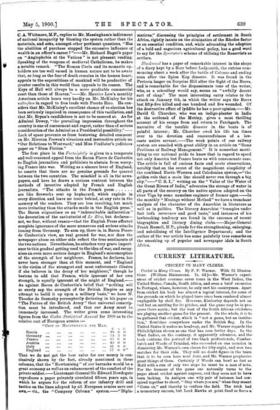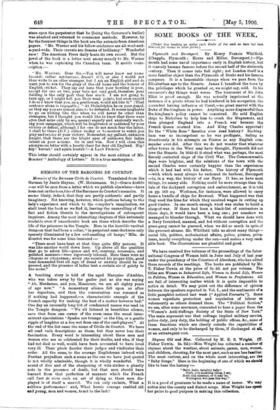C URRENT LITERAT URE.
CRICKET TN MANY CLIMES.
Cricket in Many Climes. By P. F. Warner. With 72 Illustra- tions. (W illiam Heinemann. 7s. Gd.)—Mr. Warner's experi- ences of cricket overseas cover tours in the West Indies, the United States, Canada, South Africa, and even a brief excursion to Portugal, where, however, he only met his countrymen. Apart from cricket his book has almost a topical interest, for some of the grounds on which he played have since been rendered almost unplayable by shell fire. However, Kimberley depends not on turf but on matting for its pitches, and the game may be in pro- gress there again ; hut the best of the South African cricketers are playing another game for the present. On the whole, it is to be gathered that cricket, which is "not a game, but an institu- tion," flourishes everywhere under the British flag. In the United States it makes no headway, and Mr. Warner regards the Philadelphian eleven as one that has seen better days. In the West Indies, on the contrary, it apparently advances, and the book contains the portrait of two black professionals, Cumber- batch and Woods of Trinidad, who succeeded on one occasion in dismissing Mr. Warner's own eleven for fifty-eight, and won two matches for their side. They will no doubt figure in the team that i9 to be seen hero next .Tune, and Mr. Warner prophesies great things of them. Certainly if Woods can bowl as fast as Mold with a run of only two steps he must be a man of note. For the humour of the game one naturally turns to the pages about cricket against negroes, and they seem not to have been lacking. In Antigua one wily pair of batsmen had con- spired together to shout, "Stay where you are," when they meant "Come on," and thereby to confuse the field. The trick had a momentary success, but Lord Hawke at point fixed so fierce a
stare upon the perpetrator that he (being the Governor's butler) was abashed and returned to commoner methods. However, by far the funniest things in the book are the extracts from American papers. "Mr. Warner and his fellow-cricketers are all-wool-and- a-yard-wide. Their cravats are dreams of brilliancy." Wonderful race ! The American Press daily beats its own record. But the jewel of the book is a letter sent anony mously to Mr. Warner when he was captaining the Canadian team. It merits trans- cription :—
"Ms. WARNER. Dear Sir,—You will never know my name (sounds rather mysterious, doesn't it ?), or else I would not thus write to an utter stranger, but I am an English girl and do want you to win for the glory of the old home and the honour of English cricket. They say out here that your bowling is poor, except for one or two, your bats not very good, therefore your fielding is the only part they fear much. I am not going to turn spy, or I might tell you their weak points, but even snould I do so I know that you, as a gentleman, would not like it." [That sentence alone is impayab/e.] "At Philadelphia be on your guard, as they say you are almost sure to be defeated. -It seems laughable to go on writing like this when we will never be other than strangers, but I thought you would like to know that there were eyes (not mine only by any means) eagerly and anxiously watch- ing your campaign, which will be brightened or saddened by your victory or defeat, although I for one do not much fear the latter. 1 shall be there (D.V.) either to-day or to.morrow to watch you play and rejoice at your victory. Remember, my gallant, unknown knight, that there are the bright eyes of unknown fair ladies intent on your actions. Go in and win. Now 1 will close this anonymous letter with a hearty cheer for dear old England. Hip hip ! hurrah ! and again hurrah !—A LADY FRIEND."
This letter should certainly appear in the next edition of Mr. Scoones' "Anthology of Letters." It is a true masterpiece.







































 Previous page
Previous page